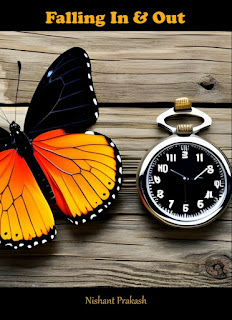Neil falls in love with his classmate Paakhi, but so does his close friend Waheed, whose love is not reciprocated. The son of an abusive and dominant father, Waheed is resentful as life never realises his ambitions and he has to perpetually stay behind the shadows of Neil. Ultimately, this discontentment results in Waheed killing Neil, which thus starts a cycle of trial and error for a better outcome that transcends the barriers of time and space.
Falling In And Out by Nishant Prakash is a novel that explores the possibilities of second chances. It reminds you of movies like Groundhog Day and Edge of Tomorrow. If there is a possibility to go back in time and live all over again, aware of all the good and bad experiences of the previous life, what will someone do? Will such a chance yield better results? Are the choices that we never make the ones that hold the key to happiness?
I cannot answer any of these questions because I am not equipped with the power to calculate the probabilities of all the variables that life throws at me, aligning them for the best possible outcomes. But I can certainly claim one thing: if the author of this book gets a chance to go back in time, he should rewrite this novel down to two hundred pages. That will make it far better and more engrossing than the present version.
Nishant Prakash is a competent storyteller, as evident from this ambitious genre-mixing attempt that is part romance, part psychological drama, and part science fiction. My issue is that he is unrestrained. There is a lot of flab in this novel: characters, passages, and conversations that never make any impact from a larger perspective; long descriptions of historical events and politics that refuse to influence the plot in any manner; and opinion pieces that never connect. More than Waheed, it is this unwanted bulk that works as the novel's antagonist. Otherwise, why should he bring in Vajpayee, Manmohan Singh, or Modi for a novel and never bother to portray the effects of political changes in its plot?
That said, the three main characters of the novel, Neil, Paakhi, and Waheed, are portrayed very convincingly. All three crave love and acceptance. It is their actions or inactions when they are denied these that carry the plot forward. The psychological impact of these characters on the plot is the saving grace of the novel. The science fiction elements also bring a welcome change from the mundane romance.

No comments:
Post a Comment